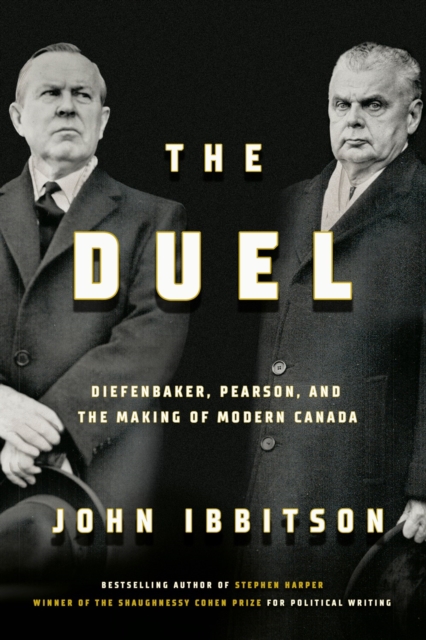The Duel: Diefenbaker, Pearson and the Making of Modern Canada

The Duel: Diefenbaker, Pearson and the Making of Modern Canada
Pearson, in turn, gave coherence to Diefenbaker's piecemeal reforms. He also pushed Parliament to adopt a new, and now much-loved, Canadian flag against Diefenbaker's fierce opposition. Pearson understood that if Canada were to be taken seriously as a nation, it must develop a stronger sense of self.
Pearson was superbly prepared for the role of prime minister: decades of experience at External Affairs, respected by leaders from Washington to Delhi to Beijing, the only Canadian to win the Nobel Prize for Peace. Diefenbaker was the better politician, though. If Pearson walked with ease in the halls of power, Diefenbaker connected with the farmers and small-town merchants and others left outside the inner circles. Diefenbaker was one of the great orators of Canadian political life; Pearson spoke with a slight lisp.
Diefenbaker was the first to get his name in the papers, as a crusading attorney: Diefenbaker for the Defence, champion of the little man. But he struggled as a politician, losing five elections before making it into the House of Commons, and becoming as estranged from the party elites as he was from the Liberals, until his ascension to the Progressive Conservative leadership in 1956 through a freakish political accident.
As a young university professor, Pearson caught the attention of the powerful men who were shaping Canada's first true department of foreign affairs, rising to prominence as the helpful fixer, the man both sides trusted, the embodiment of a new country that had earned its place through war in the c
PRP: 210.73 Lei
Acesta este Pretul Recomandat de Producator. Pretul de vanzare al produsului este afisat mai jos.
189.66Lei
189.66Lei
210.73 LeiIndisponibil
Descrierea produsului
Pearson, in turn, gave coherence to Diefenbaker's piecemeal reforms. He also pushed Parliament to adopt a new, and now much-loved, Canadian flag against Diefenbaker's fierce opposition. Pearson understood that if Canada were to be taken seriously as a nation, it must develop a stronger sense of self.
Pearson was superbly prepared for the role of prime minister: decades of experience at External Affairs, respected by leaders from Washington to Delhi to Beijing, the only Canadian to win the Nobel Prize for Peace. Diefenbaker was the better politician, though. If Pearson walked with ease in the halls of power, Diefenbaker connected with the farmers and small-town merchants and others left outside the inner circles. Diefenbaker was one of the great orators of Canadian political life; Pearson spoke with a slight lisp.
Diefenbaker was the first to get his name in the papers, as a crusading attorney: Diefenbaker for the Defence, champion of the little man. But he struggled as a politician, losing five elections before making it into the House of Commons, and becoming as estranged from the party elites as he was from the Liberals, until his ascension to the Progressive Conservative leadership in 1956 through a freakish political accident.
As a young university professor, Pearson caught the attention of the powerful men who were shaping Canada's first true department of foreign affairs, rising to prominence as the helpful fixer, the man both sides trusted, the embodiment of a new country that had earned its place through war in the c
Detaliile produsului









